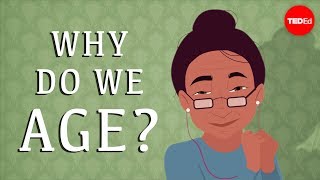(单词翻译:单击)
In 1997, a French woman named Jeanne Calment passed away after 122 years and 164 days on this Earth,
1997年, 一位叫珍妮·卡尔芒的法国女士在活了122年164天后与世长辞,
making her the oldest known person in history.
这使她成为历史记载上最长寿的人。
Her age was so astounding that a millionaire pledged $1 million to anyone who could break her record.
由于她的年龄如此令人震惊,甚至有一位百万富翁愿意付出一百万美元给任何可以打破她长寿记录的人。
But in reality, living to this age or beyond is a feat that very few, maybe even no humans, are likely to accomplish.
但事实上,能活到这个年纪或以上是个十分罕见的壮举,非常少,甚至没人可以完成这个目标。
Human bodies just aren't built for extreme aging.
人类的身体不是为极端的年龄而建造的。
Our capacity is set at about 90 years.
我们的年龄范围大概是90年。
But what does aging really mean and how does it counteract the body's efforts to stay alive?
但是年老真正意味着什么,它又是怎样对抗我们身体存活所付出努力的呢?
We know intuitively what it means to age.
我们直觉上知道年龄意味着什么。
For some, it means growing up, while for others, it's growing old.
对于某些人来说,年老是成长,对于另一些人来说,意味着变老。
Yet finding a strict scientific definition of aging is a challenge.
然而,寻找严格科学意义上的年老的定义是一个挑战。
What we can say is that aging occurs when intrinsic processes
我们可以说的是年老发生在一个内在性的过程,
and interactions with the environment, like sunlight, and toxins in the air, water, and our diets,
以及我们与环境的接触,比如说阳光和在空气、水以及我们食物里的毒素,
cause changes in the structure and function of the body's molecules and cells.
引起结构上的变化,以及人体的分子和细胞功能的变化。
Those changes in turn drive their decline, and subsequently, the failure of the whole organism.
这些变化造成它们数量的减少,最终导致整个有机体的凋零。
The exact mechanisms of aging are poorly understood.
人们对人体老化的确切机理知之甚少。
But recently, scientists have identified nine physiological traits,
但是在近年,科学家鉴定出九个生理学的特征,
ranging from genetic changes to alterations in a cell's regenerative ability that play a central role.
从基因的变化到一个细胞再生能力的变更,这个能力起着一个核心的角色。
Firstly, as the years pass, our bodies accumulate genetic damage in the form of DNA lesions.
首先,随着时间的流失,我们的身体体累计了很多基因的伤害,以DNA损伤的形式表现出来。
These occur naturally when the body's DNA replicates, but also in non-dividing cells.
当身体的DNA复制时,这些就自然发生了,但这些也在非分裂的细胞里发生。
Organelles called mitochondria are especially prone to this damage.
这个被称为线粒体的细胞器特别容易出现这种损伤。
Mitochondria produce adenosine triphosphate, or ATP, the main energy source for all cellular processes,
线粒体产生三磷酸腺苷,或者ATP,是所有的细胞过程的主要能量来源,
plus mitochondria regulate many different cell activities and play an important role in programmed cell death.
加上线粒体会调节许多不同的细胞活动,并在程序性细胞死亡中起到重要作用。
If mitochondrial function declines, then cells and, later on, whole organs, deteriorate, too.
如果线粒体功能减弱,细胞以及再后来的整个器官也会衰亡。
Other changes are known to occur in the expression patterns of genes,
其它已知变化以基因模式的表达发生,
also known as epigenetic alterations, that affect the body's tissues and cells.
这也被称为表观遗传的改变,这个改变会影响机体的组织和细胞。

Genes silenced or expressed only at low levels in newborns become prominent in older people,
一般不表达或仅在新生儿中部分表达的基因,在老年人中变得常见,
leading to the development of degenerative diseases, like Alzheimer's, which accelerate aging.
这会导致退化性疾病,比如会加速衰老的阿茨海默症。
Even if we could avoid all these harmful genetic alterations, not even our own cells could save us.
即使我们能够避免所有这些有害的基因变异,甚至我们自己的细胞都不能拯救我们。
The fact remains that cellular regeneration, the very stuff of life, declines as we age.
事实是细胞再生功能,生命重要的东西,随着我们年龄的增长而减弱。
The DNA in our cells is packaged within chromosomes,
在我们细胞中的DNA被包含在染色体内,
each of which has two protective regions at the extremities called telomeres.
每个染色体都具有在末端的两个保护区域,叫做端粒。
Those shorten every time cells replicate.
每次细胞复制时,端粒会缩短。
When telomeres become too short, cells stop replicating and die, slowing the body's ability to renew itself.
当端粒变得太短时,细胞会停止复制并且凋亡,减缓机体的自我更新能力。
With age, cells increasingly grow senescent, too,
随着年龄的增长,细胞也会日益衰老,
a process that halts the cell cycle in times of risk, like when cancer cells are proliferating.
这过程是当有风险时便停止细胞周期,例如当癌细胞增生时。
But the response also kicks in more as we age, halting cell growth and cutting short their ability to replicate.
但这个反应也因为我们的年龄而减弱,阻止细胞的生长和减弱它们的繁殖能力。
Aging also involves stem cells that reside in many tissues
衰老还涉及了驻留在许多组织中的干细胞,
and have the property of dividing without limits to replenish other cells.
那些具有无限分裂以补充其他细胞的细胞。
As we get older, stem cells decrease in number and tend to lose their regenerative potential,
当我们变老的时候,干细胞的数量会减少,并且往往会失去其再生的潜能,
affecting tissue renewal and maintenance of our organs original functions.
影响组织更新和修复我们的器官原有的功能。
Other changes revolve around cells' ability to function properly.
其它的变化包含了细胞正常工作的能力。
As they age, they stop being able to do quality control on proteins,
随着它们年龄的增长,它们停止了对蛋白质的质量控制,
causing the accumulation of damaged and potentially toxic nutrients,
这会造成损伤的和具有潜在毒性的营养物质的积累,
leading to excessive metabolic activity that could be fatal for them.
并且导致过多的代谢活性,它们可能是致命的。
Intercellular communication also slows, ultimately undermining the body's functional ability.
细胞间的信息通讯也缓慢下来,最终破坏了人体机能的作用。
There's a lot we don't yet understand about aging.
关于老化还有很多我们不知道的。
Ultimately, does longer life as we know it come down to diet, exercise, medicine, or something else?
最终,更长的寿命是不是像我们知道的归因于饮食、运动、医疗条件,或许还有其它的元素?
Will future technologies, like cell-repairing nanobots, or gene therapy, artificially extend our years?
未来的科技的发展,会像进行细胞修复的纳米机器人或者基因疗法,人为地延长我们的寿命?
And do we want to live longer than we already do?
而且我们真的想比我们现在活得长久?
Starting with 122 years as inspiration, there's no telling where our curiosity might take us.
以122年为激励的起点,我们不知道我们的好奇心会带着我们去向何处。


